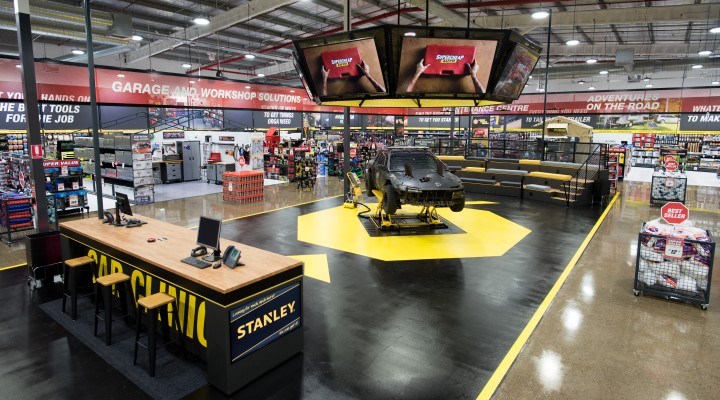According to CEO Anthony Heraghty, Super Retail Group has plenty of reasons to be positive about its performance for the year ahead. Sales across all four brands – Rebel, Macpac, Supercheap Auto and Boating, Camping and Fishing (BCF) – were up by about 15 per cent, while its profit grew by about 30 per cent for the six months to 31 December 2022. Super Cheap Auto and Macpac were particularly strong performers, with year-on-year sales up by about 18 and 55 per cent, respectively. The gr
The group reported no drawn bank debt, and $212 million cash on hand.
However, Super Retail Group now faces challenging economic conditions, and a likely slowdown in customer spending. As reported by The Australian, sales growth for Super Cheap Auto and Macpac had moderated to eight and 30 per cent respectively, between December 2022 and February 2023.
Meanwhile, like-for-like sales are expected to decline by seven per cent at the group level for the remainder of the second half in FY23, according to consensus estimates. Citi also anticipates that Super Retail Group’s EBIT will decline by eight per cent over the same period.
Heraghty told Inside Retail that the group is hoping for the best but prepared for the worst.
“I think there’s reasons to be optimistic with very strong employment continuing, strong savings and a customer that’s emerging from the psychology of lockdowns, and is keen to get out into the world,” he said.
“But we’d be silly not to acknowledge that there’s macroeconomic forces that are quite significant. [It’s] appropriate not to get too animated about that, and simply play the cards you’re dealt with as best you can. I think we’ve been proactive in managing the business and preparing it for a dynamic period.”
As spending and confidence deflates, Heraghty believes that Super Retail Group is in a position to “run both sides of the cycle.”
“In Supercheap [Auto] for instance, as customers come under pressure, they’ll keep their car for longer, [and] look to do more self-service and DIY on their own maintenance. Supercheap is a beneficiary of that, and runs quite strongly in a negative cycle,” he said.
He added that BCF performed well amid Covid-19 restrictions, as customers sought to travel domestically. With customers less likely to travel overseas due to financial pressures, he said that BCF would be a beneficiary in a counter-cycle.
Regarding Macpac, Heraghty believes there’s a trend in the hiking, bushwalking and tramping space, which isn’t attached to international travel. This, he said, would propel the business even if international travel slows down.
“Even [with] Rebel; when people are under pressure, staying fit and healthy [will] sustain regardless of the economic cycle. These aren’t big ticket items with high average selling prices to get into the activity,” Heraghty said.
“If you manage it correctly, [these macroeconomic forces] won’t necessarily have a material impact [on the business].”
Changing demand
According to Heraghty, customer behaviour has changed radically over the last few years.
With excess cash flow amid Covid-19 stimulus measures, he said that consumers opted for big ticket items like big toolboxes and fish sounders. Now that the economy has moderated and normalised, he said that customers have shifted from wants to needs.
While Super Retail Group’s big ticket items aren’t receiving the same level of demand as in the past, its consumable products have become more popular. “Instead of buying a treadmill, [customers might] buy a pair of sneakers,” Heraghty said.
“For us, that doesn’t create problems as the underlying demand is there. It’s just that the nature of the demand has changed.”
The group has invested about $10 million in operating expenses into its personalisation offering, in order to launch new loyalty programs and personalisation offers using first-person data.
According to Lemme, Super Retail Group’s continued investment in growing its customer experience offering and improving the business’s analytics capability – together with its net cash balance sheet – leave the brand well-placed to navigate a difficult economic environment.
Heraghty noted that a deeper understanding of its customers – beyond psychographics and generalities – would help to inform its merchandise, promotional and pricing strategy.
“Retail is a relatively simple game that’s difficult to execute. [It’s about] understanding customer needs, seeking to meet it and executing it profitability,” he said.
Inventory management
In its analysis of Super Retail Group’s half-year results, Citi was “somewhat concerned” about the $76 million increase in spending on inventory from FY22, as per the retailer’s January trading update.
But Lemme took comfort in the fact that the group’s inventory and sales were not too far above pre-Covid-19 levels. He predicted that inventory levels would continue to normalise in the second half of 2023.
According to Heraghty, the key reasons to clear stock quickly are if the stock is perishable, or if the brand is under pressure from a cash flow perspective.
As the brand doesn’t have many perishable items – for instance, a toolbox today would be largely similar to the same product in two weeks’ time – and has a strong balance sheet with net cash and no debt, it can carefully and methodically decrease its inventory to traditional levels.
“We’re well in the process of doing [this] without too much drama,” he said.
Last month, Fair Work Ombudsman (FWO) commenced legal proceedings against the group and four subsidiary companies, alleging underpayments.







